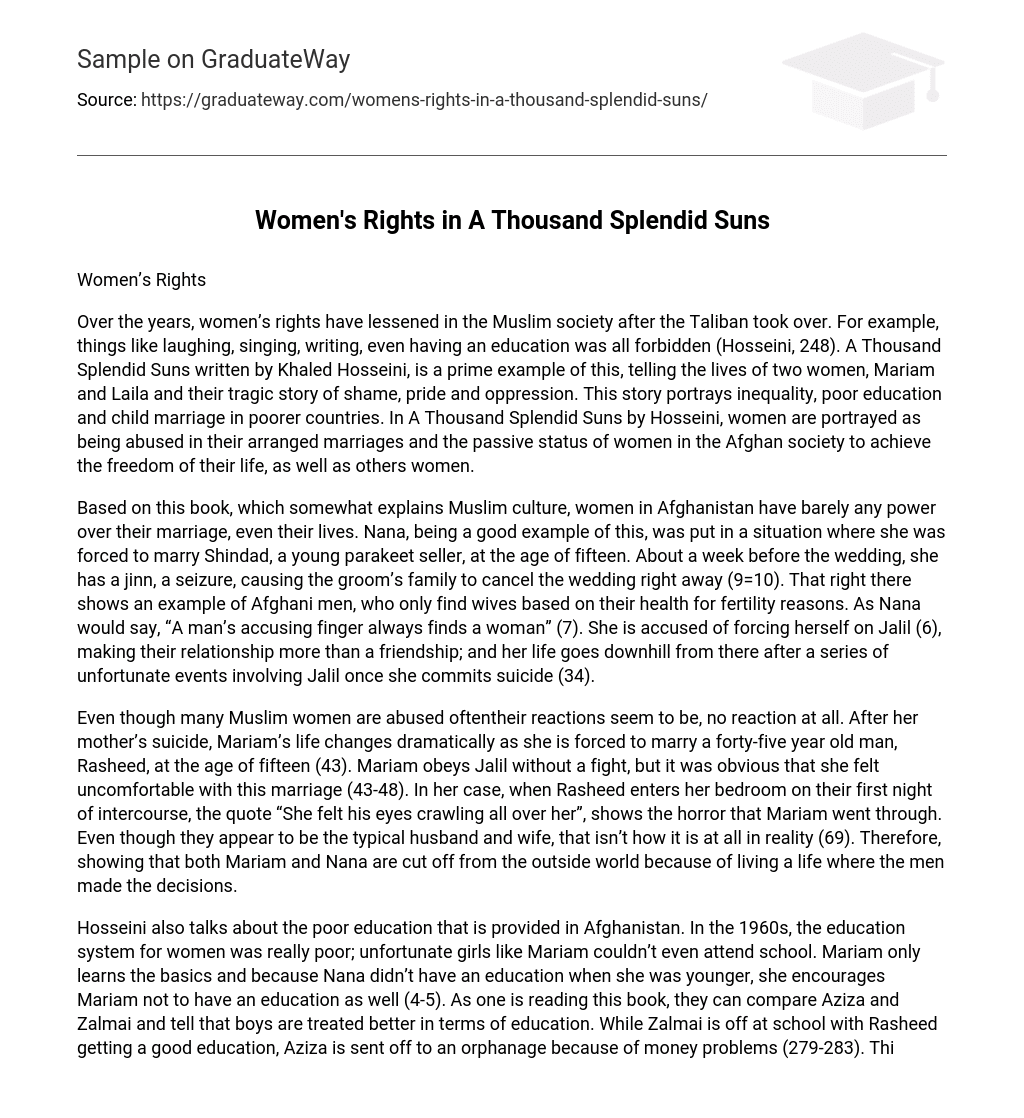Women’s Rights
Over the years, women’s rights have lessened in the Muslim society after the Taliban took over. For example, things like laughing, singing, writing, even having an education was all forbidden (Hosseini, 248). A Thousand Splendid Suns written by Khaled Hosseini, is a prime example of this, telling the lives of two women, Mariam and Laila and their tragic story of shame, pride and oppression. This story portrays inequality, poor education and child marriage in poorer countries. In A Thousand Splendid Suns by Hosseini, women are portrayed as being abused in their arranged marriages and the passive status of women in the Afghan society to achieve the freedom of their life, as well as others women.
Based on this book, which somewhat explains Muslim culture, women in Afghanistan have barely any power over their marriage, even their lives. Nana, being a good example of this, was put in a situation where she was forced to marry Shindad, a young parakeet seller, at the age of fifteen. About a week before the wedding, she has a jinn, a seizure, causing the groom’s family to cancel the wedding right away (9=10). That right there shows an example of Afghani men, who only find wives based on their health for fertility reasons. As Nana would say, “A man’s accusing finger always finds a woman” (7). She is accused of forcing herself on Jalil (6), making their relationship more than a friendship; and her life goes downhill from there after a series of unfortunate events involving Jalil once she commits suicide (34).
Even though many Muslim women are abused oftentheir reactions seem to be, no reaction at all. After her mother’s suicide, Mariam’s life changes dramatically as she is forced to marry a forty-five year old man, Rasheed, at the age of fifteen (43). Mariam obeys Jalil without a fight, but it was obvious that she felt uncomfortable with this marriage (43-48). In her case, when Rasheed enters her bedroom on their first night of intercourse, the quote “She felt his eyes crawling all over her”, shows the horror that Mariam went through. Even though they appear to be the typical husband and wife, that isn’t how it is at all in reality (69). Therefore, showing that both Mariam and Nana are cut off from the outside world because of living a life where the men made the decisions.
Hosseini also talks about the poor education that is provided in Afghanistan. In the 1960s, the education system for women was really poor; unfortunate girls like Mariam couldn’t even attend school. Mariam only learns the basics and because Nana didn’t have an education when she was younger, she encourages Mariam not to have an education as well (4-5). As one is reading this book, they can compare Aziza and Zalmai and tell that boys are treated better in terms of education. While Zalmai is off at school with Rasheed getting a good education, Aziza is sent off to an orphanage because of money problems (279-283). This creates many problems for younger girls including child marriage.
Being a typical age to marry, both Laila and Mariam got married at sixteen (48,196). However, because the girls are so young when they get married, miscarriages are more common. Mariam was impregnated at sixteen with Rasheed’s baby but, as it was described in chapter thirteen, “Then there was blood and she was screaming.” Mariam’s baby dies in her womb in the haram bathhouse (81). Although this may seem tragic, this happens to a lot of girls in Afghanistan.
Now, even though women’s education is very poor in Afghanistan, education is equally as important for men. Being the dominant leader in Muslim families, the fathers must also have a proper education to teach and support their children. Babi, Laila’s father and Mullah Faizulah already know that education can lead to a better country. Babi also makes it clear to Laila that the most important thing in his life after her safety, is her schooling.” Marriage can wait, education cannot. Because society has no chance of success if its women are uneducated.” (103). On the other hand, people like Jalil and Rasheed don’t understand the importance of education as much. Even though there are men like Babi who say that education is crucial, the majority of the Afghani culture still don’t allow it for women.
Thus, it is important for men to have a proper education just as much as it is for women, so they should have equal rights.
Although the Taliban ruling has restricted many Afghani women, the story ends with Laila teaching at the orphanage giving hopeful insights for the future (364-367). It shows that even if girls only learn a little, they can grow up to be like Laila and have the courage to help future generations.
Works Cited
Hosseini, Khaled. A Thousand Splendid Suns. U.S.A: Penguin Group, 2007. Print.





